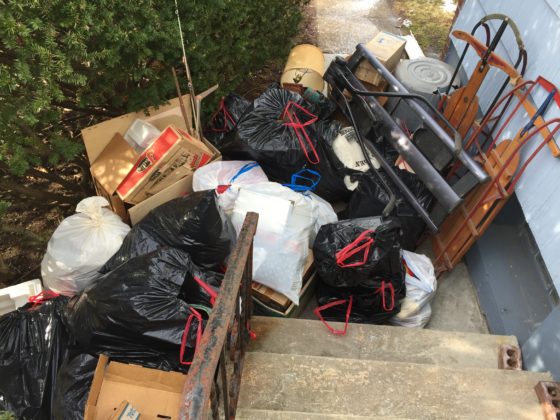
This week, my parents moved from the house I grew up in to an apartment. They don’t need as much space and the move has many pluses for them. Most importantly, they will no longer be responsible for maintaining their property and the apartment is one level, which will make life easier for my mom, who likes to minimize how much she has to climb stairs.
In January, my parents went to Florida (from New Jersey) to spend time with my aunt and uncle. While they were there, I went to their New Jersey house, with their permission, to begin the process of their move—specifically, throwing out as much as possible.
Finding things to throw out was not hard. Before they left for Florida, I had my dad put post-it notes on anything in their basement he wanted to keep. I then went in with big, black, trash bags and began filling them with everything else that didn’t warrant donation.
After doing a lot in the basement, I went up to the attic. Once there, I called my sister and talked with her as I went through things, for example, her notebooks from high school and college (all of which she had me throw out). I also threw out a lot more: a popcorn popper from the 1980s, a meat-grinder from the 1960s, empty boxes and Styrofoam from products my parents had purchased over the years, carpet remnants, pieces of carpet padding, and much more.
Those empty boxes reminded me of something I had read a few weeks earlier in this excellent piece, 10 Things You Should Throw Away Before 2018.
Unless you plan on reselling certain electronics you purchased (having the original packaging increases the item’s worth), your product packaging should always be recycled. “Collecting cardboard is a fire hazard and takes up a lot of space unnecessarily.”
I am pretty ruthless about throwing things out. When I found items with sentimental value, I took photos with my phone before tossing them.
It didn’t shock me that my parents collected all the “junk” I threw out that day (and on five or six additional visits). They lived in that house for over 50 years and were raised by my grandparents, who grew up during the depression. I’m sure you’ve heard of the depression-era mentality which includes, among other things, the idea that you don’t throw anything out because you might need it someday.
I also found tax returns and receipts from the 1990s, 1980s, and 1970s. On a subsequent visit, I found tax returns from the 1960s. And on another visit I found my grandparents’ tax returns—the fourth of my four grandparents passed away over 35 years ago. I had to pay to have them shredded. (There are ways to have your papers shredded free, but they usually have a limit on how many pounds they will accept at one time. In our case, it was close to 500 pounds, way over the limit for our county’s shredding day.)
My kids will not have to go through anything close to what I did for my parents. I texted my kids the photo accompanying this post with this note: “Phase 1 of Papa and Grandma’s house. I promise you will never have to do this for us. We don’t keep this kind of stuff!!”
During our 26-plus years as parents, Marcie and I have consistently given away clothing, books, and toys our children outgrew, along with clothing we no longer wear. That behavior was partly inspired by my desire to never have our attic look the way I knew my parents’ attic looked.
As I wrote in this post about giving things away, I have also applied this to other objects in my house, following the saying, “If it doesn’t bring me joy, give it away to someone who can use it.” This makes everyone happy: the recipient, me, and my children who one day will remember the time I promised they would never have to throw away a ton of things from my house.
What’s your experience with throwing out or donating things you do not use, rather than letting them collect dust? Please join the conversation with your comments…
Best regards,
David
